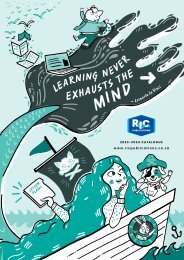RIC-6976 Phonological awareness skills Book 5 p1-23
Create successful ePaper yourself
Turn your PDF publications into a flip-book with our unique Google optimized e-Paper software.
ASSESSING PHONOLOGICAL AWARENESS SKILLS<br />
<strong>Phonological</strong> <strong>awareness</strong> <strong>skills</strong> play an important part in early childhood<br />
learning. It is therefore essential to screen children as early as possible<br />
so that any gaps in education, misconceptions or weaknesses can<br />
be remedied quickly. Learning difficulties should be detected and<br />
rectified as early as possible so that issues of poor self-esteem do not<br />
develop.<br />
<strong>Phonological</strong> <strong>awareness</strong> is a strong predictor of literacy development<br />
and the <strong>Phonological</strong> pre-tests provide an overview of pre- reading<br />
<strong>skills</strong> needed for literacy development.<br />
Levels of phonological <strong>awareness</strong><br />
word<br />
syllable<br />
onset and rime<br />
phoneme<br />
PRE-TESTING AND POST-TESTING<br />
It is essential to assess young children on their phonological <strong>awareness</strong> <strong>skills</strong> before introducing<br />
specific ones.<br />
<strong>Phonological</strong> <strong>awareness</strong> testing should occur early at kindergarten or prep level, and monitoring of<br />
the children’s progress should continue throughout the year.<br />
Both pre- and post-testing have been provided in this book. All tests should be administered on a<br />
one-to-one basis.<br />
The post- tests provided in this book are comprehensive and have a greater degree of difficulty,<br />
assessing a child’s understanding of phonological <strong>awareness</strong> <strong>skills</strong>. In-depth assessments are<br />
provided at the end of each skill section. An assessment covering all <strong>skills</strong> in the book is provided on<br />
pages 215–216. Once gaps in learning or misconceptions have been identified, teachers can utilise<br />
the information to further assist children experiencing learning difficulties.<br />
Full instructions are provided and no resources are required to carry out the testing. A section is<br />
provided for teachers to make comments about children’s responses.<br />
Teachers should use their own initiative about when to stop the testing if students are confused,<br />
frustrated or find the test too easy (when it is very obvious they have mastered the skill).<br />
A class recording sheet is provided on page 217 for the pre-test and for the post-test. More than<br />
one copy of the checklist may need to be printed to cover all the children in the class. Options for<br />
colouring the results are suggested to make it easier to view results at a glance.<br />
To administer the assessments, teachers or adult helpers will need:<br />
• one set of assessment task sheets for each child<br />
• three simple sound items for the auditory discrimination task<br />
• class recording sheet<br />
Administering the tests:<br />
• Assess children individually.<br />
• Give clear instructions (these are included).<br />
• Assess in an area where there are few distractions.<br />
• Model examples so children have a clear understanding of the tasks.<br />
• Record responses and comment about automaticity of answers.<br />
• Work through each section until the children have four consecutive incorrect answers.<br />
viii<br />
PHONOLOGICAL AWARENESS SKILLS (<strong>Book</strong> 5) ISBN 978-1-925698-56-5 www.ricpublications.com.au


















